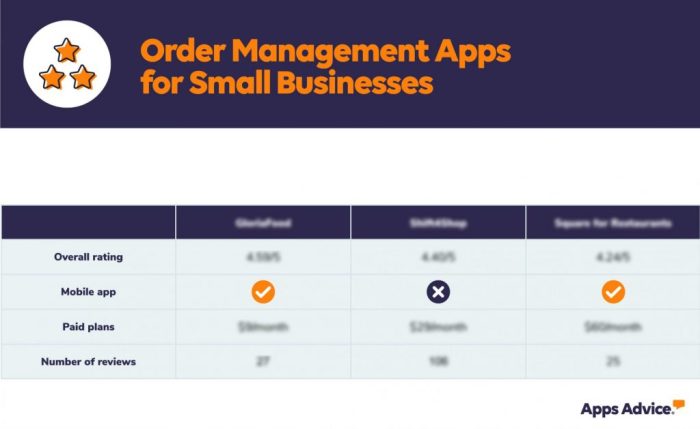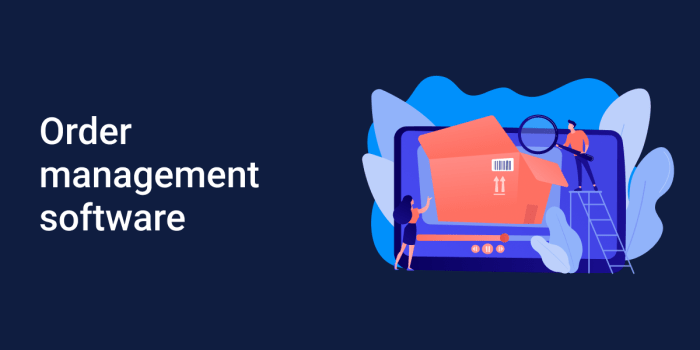Order fulfillment software small business solutions are transforming how small businesses manage their operations. Efficient order processing, inventory management, and shipping are crucial for growth, and the right software can streamline these processes significantly, leading to increased productivity and customer satisfaction. This exploration delves into the benefits and considerations of implementing such software for enhanced small business success.

Source: blinkco.io
From automating order entry and tracking to integrating with various shipping carriers and managing inventory levels, these software solutions offer a comprehensive approach to fulfillment. This allows business owners to focus on other aspects of their business, such as marketing and customer engagement, while ensuring timely and accurate order delivery. The selection process, however, requires careful consideration of features, scalability, and cost-effectiveness to ensure a suitable fit for individual business needs.
In today’s fast-paced e-commerce landscape, efficient order fulfillment is no longer a luxury—it’s a necessity. For small businesses, juggling inventory management, shipping logistics, and customer communication can feel overwhelming. This is where order fulfillment software steps in, offering a powerful solution to streamline operations and boost profitability. This detailed guide explores the world of order fulfillment software for small businesses, covering everything from choosing the right system to maximizing its benefits.
Understanding Order Fulfillment Software for Small Businesses
Order fulfillment software automates and integrates various aspects of the order processing cycle, from the moment a customer places an order to its delivery. This includes tasks such as:
- Order Management: Automating order receiving, processing, and tracking.
- Inventory Management: Tracking stock levels, managing warehouse space, and preventing stockouts.
- Shipping and Logistics: Generating shipping labels, calculating shipping costs, and selecting optimal carriers.
- Customer Communication: Automating order confirmations, shipping updates, and delivery notifications.
- Reporting and Analytics: Providing insights into order volume, shipping costs, and other key metrics.
By automating these processes, order fulfillment software frees up valuable time and resources, allowing small business owners to focus on growth and other strategic initiatives. It also minimizes errors, improves accuracy, and enhances customer satisfaction.
Key Features to Look for in Order Fulfillment Software: Order Fulfillment Software Small Business
Choosing the right order fulfillment software is crucial. Consider these key features:
Integration Capabilities
Seamless integration with your existing e-commerce platform (Shopify, WooCommerce, etc.), accounting software (Xero, QuickBooks), and shipping carriers (UPS, FedEx, USPS) is paramount. This eliminates manual data entry and reduces the risk of errors.
Inventory Management Tools
Look for robust inventory tracking capabilities, including real-time stock updates, low-stock alerts, and forecasting tools. Accurate inventory management is essential for preventing stockouts and overstocking.
Shipping and Logistics Functionality
The software should offer features like automated shipping label generation, real-time shipping rate calculations, and carrier selection based on cost and delivery time. Integration with multiple carriers provides flexibility and competitive pricing.
Customer Relationship Management (CRM) Integration
Connecting your order fulfillment software with your CRM system allows for personalized communication with customers, providing timely updates and addressing any concerns promptly. This improves customer satisfaction and loyalty.
Reporting and Analytics, Order fulfillment software small business
Comprehensive reporting and analytics dashboards provide valuable insights into your order fulfillment process. Track key metrics such as order processing time, shipping costs, and customer satisfaction to identify areas for improvement.
Scalability and Flexibility
As your business grows, your order fulfillment software should be able to scale to meet your increasing demands. Choose a system that can adapt to your evolving needs without requiring a complete overhaul.
Top Order Fulfillment Software Options for Small Businesses
The market offers a variety of order fulfillment software solutions catering to different business sizes and needs. Some popular options include:
- Shopify Fulfillment Network: A comprehensive fulfillment solution integrated directly with Shopify.
- ShipStation: A powerful multi-carrier shipping solution with robust features and integrations.
- OrderCup: A versatile platform offering order management, inventory control, and shipping automation.
- Brightpearl: A comprehensive retail management system that includes order fulfillment capabilities.
- Delighted: Focuses on post-purchase customer communication and feedback.
It’s important to research and compare different options based on your specific requirements and budget before making a decision. Many providers offer free trials or demos, allowing you to test the software before committing.
Implementing and Optimizing Your Order Fulfillment Software
Successfully implementing order fulfillment software requires careful planning and execution. Consider these steps:
- Assess your needs: Identify your current challenges and define your requirements for order fulfillment software.
- Choose the right software: Research different options and select a system that aligns with your budget and needs.
- Integrate with existing systems: Ensure seamless integration with your e-commerce platform, accounting software, and shipping carriers.
- Train your team: Provide adequate training to your team on how to use the software effectively.
- Monitor and optimize: Regularly monitor key metrics and make adjustments to optimize your order fulfillment process.
Frequently Asked Questions (FAQ)
- Q: How much does order fulfillment software cost? A: The cost varies widely depending on the features, provider, and your business needs. Some offer subscription-based pricing, while others charge per order or transaction.
- Q: Is order fulfillment software suitable for all small businesses? A: While not essential for all, it’s highly beneficial for businesses experiencing rapid growth or facing challenges with manual order processing.
- Q: How long does it take to implement order fulfillment software? A: Implementation time depends on the complexity of the software and your existing systems. It can range from a few days to several weeks.
- Q: Can I integrate my existing inventory system with order fulfillment software? A: Most order fulfillment software offers integration capabilities with various inventory management systems. Check compatibility before purchasing.
- Q: What are the benefits of using order fulfillment software? A: Benefits include improved efficiency, reduced errors, increased accuracy, enhanced customer satisfaction, and better inventory management.
Conclusion
Order fulfillment software is a game-changer for small businesses looking to optimize their operations and enhance customer experience. By automating key processes and providing valuable insights, it empowers businesses to scale efficiently and focus on growth. Choosing the right software and implementing it effectively is crucial for maximizing its benefits. Take the time to research your options and select a solution that aligns with your unique needs and budget.
References
Call to Action
Ready to streamline your order fulfillment process and boost your small business’s efficiency? Explore the options mentioned above and choose the software that best fits your needs. Start your free trial today and experience the difference!
Ultimately, investing in order fulfillment software is a strategic move for small businesses aiming to scale efficiently and enhance customer experience. By automating repetitive tasks and providing real-time data, this technology empowers businesses to operate more effectively and competitively. Careful evaluation of available options, considering factors like integration capabilities and long-term scalability, will ensure a successful implementation and a significant return on investment.
FAQ Summary
What are the common features of order fulfillment software for small businesses?

Source: bordio.com
Common features include order management, inventory tracking, shipping label generation, integration with e-commerce platforms, reporting and analytics, and customer relationship management (CRM) integration.
How much does order fulfillment software typically cost?
Pricing varies greatly depending on features, scalability, and the vendor. Expect monthly subscription fees ranging from basic plans for a few hundred dollars annually to more enterprise-level solutions costing thousands.
Can I integrate order fulfillment software with my existing e-commerce platform?
Most reputable software solutions offer integrations with popular e-commerce platforms like Shopify, WooCommerce, and Magento. However, it’s crucial to verify compatibility before purchasing.
What are the key benefits of using order fulfillment software?
Key benefits include reduced manual errors, improved order accuracy, faster processing times, optimized inventory management, enhanced customer satisfaction, and increased efficiency, freeing up time for other business priorities.